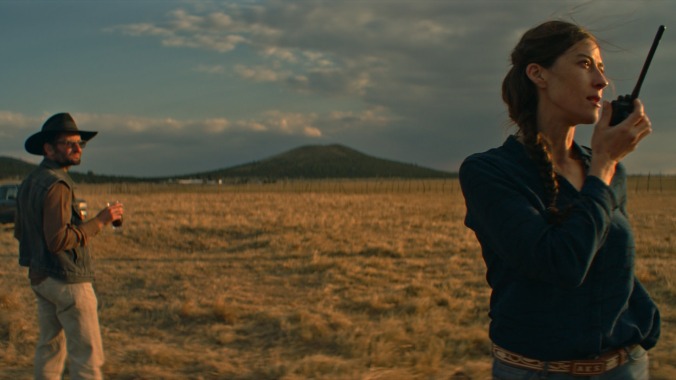Carlos Reygadas wastes Our Time with a very long therapy session masquerading as a drama

Twelve years ago, the Mexican filmmaker Carlos Reygadas fashioned a towering masterpiece from a simple tale of marital infidelity. Silent Light’s emotions were simple and universal, but Reygadas told its story via majestic images, and he chose a striking, unexpected milieu: Mexico’s Mennonite community (closely related to the Amish—both are Anabaptist sects—but arguably even more conservative). The film runs nearly two-and-a-half hours, but every minute feels earned.
That’s decidedly not the case with Reygadas’ latest effort, Our Time, which clocks in at nearly three hours. This, too, is an elemental portrait of a marriage in crisis, but he’s chosen to film a lot closer to home. The central couple, Juan and Ester, are played by Reygadas (not generally an actor—one of his two previous roles is “Man hugging woman [uncredited]”) and his actual wife, Natalia López (who normally works as an editor, for Reygadas and others). Their real-life children appear as Juan and Ester’s kids. And it’s rumored that the movie’s scenario, which involves a tumultuous, semi-disastrous attempt at polyamory, reflects events that they themselves experienced, re-created on screen as a sort of exorcism. Reygadas deflects that question in interviews—he’s even claimed that Silent Light feels more autobiographical to him—and the answer ultimately doesn’t matter much. However truthful or invented Our Time may be, its dynamic is tiresomely petty and small, resisting Reygadas’ occasional efforts at expressionism. It plays like therapy.
For a while, there doesn’t appear to be any narrative at all. The first 15 minutes or so constitute a less thrilling reprise of Post Tenebras Lux’s celebrated opening, observing a group of little kids playing in the ocean (and then in dried mud), seemingly oblivious to the camera, before shifting focus to a separate group of hormonal teenagers. Life’s chaos thus firmly established, we finally meet Juan, who owns a ranch on which he raises heavily symbolic bulls, but is also eventually revealed to be a world-renowned poet, forever jetting across the globe to collect prizes. (Reygadas’ actual profession is a tad more credible in that respect.) Ester runs the place most of the time, and has recently begun a physical relationship with an expat American, Phil (Phil Burgers), who’s been hired to help break some horses. In theory, Juan is okay with this—dialogue implies that he and Ester had previously agreed to open up their marriage, sexually if not romantically. In practice, however, the situation drives him totally bonkers, to the point where he starts secretly watching them while they screw. Not being possessive isn’t something at which he excels.
That’s a fine, relatively underexplored dramatic subject, but Reygadas—whether because he’s too close to the material or insufficiently imaginative—does surprisingly little with it, especially considering the film’s epic length. Once Juan’s insecurity and jealousy have been established, they remain a mildly mortifying constant; we never get any sense of what the couple had hoped to gain by sleeping with other people (indeed, it’s not even clear whether Juan wants to—”You fuck Michelle, okay?” Ester suggests at one point as she heads off to bang Phil at a party, but he ignores her and follows them instead), nor of why they don’t simply call off the experiment once it becomes abundantly clear that Juan can’t handle it. First-rate performances might have clarified matters, but Reygadas’ penchant for working with nonprofessional actors is a real liability this time, with all three leads (including the filmmaker himself) looking notably stiff and self-conscious throughout. Burgers, in particular, is so awkward that Phil becomes more concept than character, which makes it difficult to perceive him as a potential threat even if one tries to see him through Juan’s distorted vision.
Reygadas’ own vision remains unclouded, and he does strive to make Our Time formally exciting, albeit mostly by interjecting random rhythmic interludes. In addition to the freewheeling, extemporaneous prologue featuring the kids (who are otherwise rarely seen), we get an extended sequence at a timpani concert that Ester attends; a detailed tour of her car’s engine accompanied, for some reason, by Genesis’ “The Carpet Crawlers;” and numerous shots of bulls violently charging each other, or killing a mule (in what looks very much like unsimulated footage, squeamish animal lovers), which can’t help but suggest a correlative to what’s happening among the humans. While these flourishes are welcome, in that they break up the monotony, they’re overshadowed by all the unaccustomed verbiage. Reygadas can’t quite figure out how to externalize these emotions, so he throws in omniscient voice-over narration (inexplicably delivered by a little girl, presumably Juan and Ester’s daughter), long letters spoken aloud, even a multi-paragraph email that we just read on a laptop screen for several minutes as words appear one by one. Everyone’s feelings get aired in complete sentences, yet nothing is resolved, nor even approaches catharsis. There’s way too much time indulged here, and not nearly enough light or silence.